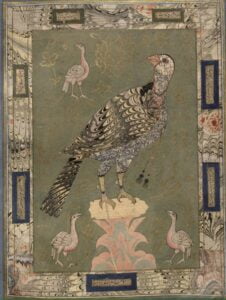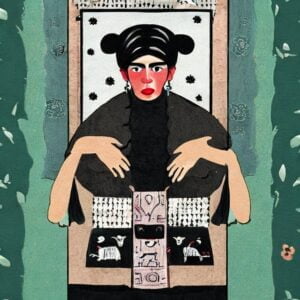An Indian artist, happily running an art studio with her mother in the heart of the Middle East, faces a barrage of questions from her relatives asking her to get a “real job” and “settle down.” This is how she responds.

In the summer of 2018, my mother and I hatched a plan. I was still in university, pursuing a degree in English literature (deemed useless because it was in the humanities). She was in the middle of moving countries, following my father’s new job. It had taken a lot out of her to leave the ultra glam city she was born in, and it had taken a lot out of us to convince her a fresh start may actually be a good thing.
So the plan was to set up a business of our own in this new country. As two artists, the obvious idea was to teach people art, work on commissions, and inculcate a more layperson-friendly culture for painting and drawing in Bahrain.
Cut to five years and a pandemic later: I’ve just received perhaps the millionth text from a relative, advising me to shut shop and work for a multinational company instead (there are 600 vacancies, he says). I don’t respond.
It took us a year to gather the courage to apply for a commercial license, but in 2019 we took the plunge. Before that, we taught casual classes to people who were willing to draw self-portraits in the middle of a coffee shop below our apartment. By 2020, my dad’s job crumbled, as it did for so many in the travel industry. The business partner my mum had faith in to get us some corporate clients backed out and left the country. Those two years were tough but also reassuring. Suddenly, the entire world had time, and childhood artists could return to their old hobbies.
When it seemed like the world had come to a standstill, ships unable to move and planes not leaving the ground, my mother and I shuffled from one class to another – putting food on the table, and cooking it too. It was absolutely terrifying, seeing people drop like flies before the vaccine was introduced, and being at high risk myself, we took all precautions – turning classes online and international.
If anything, we were living proof that artists don’t starve. We worked day and night, like most corporate slaves do, building curriculums, courses, and experiences to help uplift people in an “unprecedented time”.
Despite making it out of those two years alive, let alone successful, we still keep getting these damn texts.
Being the younger of the two founders, as well as the “fresh grad”, practically everyone in my family has told me to give up, go home, and actually get paid. And I won’t lie, it’s tempting sometimes, because the one thing harder than living with your mother is also working with her. From home.
Still, the more I hear this, the more I realise that the women I grew up around all gave up their passions for close to nothing. My aunt’s sewing machine comes out rarely. Yet another one’s talent for couture-level styling (for real, she is the family fashion icon) is put to use mostly on her daughter. My grandmother spends her days doing dishes, addicted to servitude even when there is no one to serve.
Historically, women have fought so hard to work, to make some money, to build their own lives – and now in an age where we can work for ourselves, providing the services we want to, our support systems worry for us. At first glance, this is perhaps justified by concerns of stability, of “being settled”.
But dust settles. I’m not dust, thank you. The women I see everyday are far from settled. The women I know are eagle eyed, quick to spot one loose stitch in a piece of clothing before they buy it. So why do we settle?
Personally, I think working for (read: under) other people is an experience. Of course, it takes a great deal of privilege to say that. It also takes equal privilege (and/or luck) to find a job with people you enjoy working with, for a cause that empowers you. This opinion doesn’t come from fiction, but after working for other companies for close to a year. I have worked in spaces that offered me great paychecks, quick promotions, and insidious abuse. It was the perfect disaster: being verbally greeted with racist remarks, no health insurance, absolutely no down time (this is very literal in the Middle East), delayed salaries, and the office slimeball performing his daily duty of sexually harassing everyone without a dick and balls.
For those of us who have the resources to be self-employed, I don’t see why we must go through the pains of being paid unfairly, being ambushed by coworkers, gaslighted by our superiors, and feeling we have to do so just to put food on the table. Even then, resources don’t always look like shiny new products or a brand new space. There were days we used the shelf of our own refrigerator as a palette for students, and bought wholesale turpentine from hardware stores instead of products marketed for artists. What I’m trying to say is that the label on the bottle doesn’t change what’s inside.
Some will say these are challenges you must face so you know how to “manage people.” I don’t agree. I think that skill will come no matter where or how you work. Business is, at its roots, closing deals, it’s making allies, it’s realising that most people will use you for their own benefit. But you get paid what you’re worth, you get paid on time, and you decide how you get to impact the world.
I spent one year working on this little art project, which has now seen good, bad and the downright ugly sides of business – and these days I’m grateful to report that most of that work has paid off. We’re at a point where clients come to us, media come to us, and if we want, we get to actually take a slow morning. If any of us is in pain, we get to reschedule a class. We get to work from a bar, from a desk, or from overseas. It’s not all roses and rainbows, of course, but I’d take this over the daily denigration at my old shit job for sure.
We know about the historical role of women as caretakers. Of the feminization of our labour, the sacrificial emotional and physical work it takes to care for our families, and communities. There are a million articles about it all over the internet. And still, when we ask for faith in the face of more success than anyone expected, we’re asking for too much?
It’s odd, business at its core is about inspiring faith and trust in your customers or collaborators, to move towards a specific goal, and after nearly four years of inspiring this trust in strangers who have become family, the rest of my bloodline doesn’t seem to get it.
With that respect or without it, the studio opens its doors tomorrow at 9am. Our students will come in, creating artwork they didn’t know they could, and I’ll lay out plans for new courses releasing later this year on my laptop. My mother will guide these strangers’ brushstrokes, and I will make sure people know about it.
For those of you starting businesses but fearful of the outcome, do it anyway. For those of you waiting for approval, I have some bad news. But if you’re imagining a future where you get to do your own thing, with the peace of mind that slowly but surely leads to happiness beyond a Christmas bonus, then I’ve got some better news. Just remember to be your biggest cheerleader.

Kaav Ranj
Kaav is a poet and educator, teaching art, public speaking and poetry to adults and children across the Middle East. She currently lives in Bahrain where she runs an art & wellness studio with her mother. Kaav and her mother are the rebelliously creative, recklessly authentic blahcksheep in a herd of calculating, practical corporate mutton.



